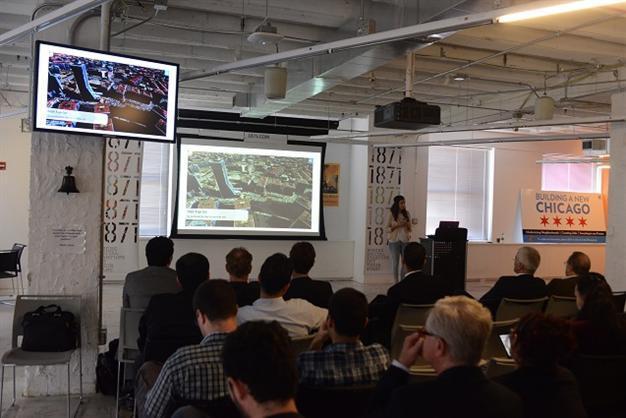BLOG: American investors keep an eye on Turkish start-ups in Chicago
Naile Berna - CHICAGO*
 Brothers Göktuğ and Berkay Yılmaz responded humbly with laughter Thursday morning, when entrepreneurs in the auditorium of 1871 in Chicago pointed out that their product Kreix could be a revenue-generating marketing gimmick beyond the scope of what they envisioned it to be.
Brothers Göktuğ and Berkay Yılmaz responded humbly with laughter Thursday morning, when entrepreneurs in the auditorium of 1871 in Chicago pointed out that their product Kreix could be a revenue-generating marketing gimmick beyond the scope of what they envisioned it to be. “We know that,” they added. Both brothers are computer software developers who spent their time playing video games, and they claim they get to do what they love for a living. They are from Ankara, and both graduated from Middle Eastern Technical University. They are one of the nine companies selected to come to the United States, out of 20 start-ups that work with the Teknojumpp Accelerator Program, in order to present their product to entrepreneurs and investors here at the Demo Day in Chicago.
The Teknojumpp Accelerator Program was initiated by ODTÜ Teknokent, which houses more than 300 hundred start-ups, with services from Sente-Advisory based in Chicago. This is the second time the Accelerator Program sent start-ups to the U.S. Invidyo, one of the companies included in last year’s cohort, was able to raise enough funds to open up to the U.S. Market. They now have an office in Florida and sell their product on Amazon. Another, Speednext, is continuing its fundraising efforts in Turkey and plans on entering the U.S. market next year.
In this environment, in which interest rates remain so low, investors in the U.S. get the bigger bang for their buck through venture capital investments. Some companies do not turn out as initially planned, but when they do, strategic exits let investors reap profits. This requires thorough research and due-diligence of the start-up companies, from the business model to the company structure and characteristics of the board members and employees.
Serhat Çiçekoğlu, one of the founders of the Sente-Advisory, does just this. He has been spending most of his time with his mentees since they arrived two weeks ago from Turkey. He has analyzed their financial models, advised their business about legal frameworks and accounting principles in the U.S., arranged strategic meetings with industry experts and Turkish-American community leaders and prepped them for their presentations. Çiçekoğlu says he spends more time with the mentees individually than they do with their families. His efforts clearly are paying off. For the first time, investors in America are keeping an eye on Turkish start-ups.
While Venture Capital has already become one of the most vibrant and well-known sectors in the U.S., in Turkey it is just starting to develop. Kemal Apaydın, one of the co-founders of the company Chain, says he is amazed by how quickly personal networking benefits their efforts in the U.S. He receives partnership requests from company owners whom he hasn’t personally met, through the relationships he has built in the Chicagoland area during the past two weeks.
“When I talk to the investors, they pull up their phones and show me the apps of companies they had invested in, then go on showing the company boards they serve. It isn’t just sweet talk, they are very involved and there is real interest,” Apaydın says. He has already secured a university as a customer for their network-building app, which was also used by Demo Day attendants. He applauds the structure of the accelerator program and hopes that more start-ups in Turkey will be able to take advantage of it in coming years.
Sarper Celenk, who represents Reengen, a company developing energy management software for smarter buildings and grids, says he is very excited to see a real demand for their products. The company has already signed businesses in Turkey, and they are now working to adapt their business model to the U.S. markets. During the short period of time they have spent in Chicago, they have been solicited by a company with a solid customer base in the U.S. that wants to start strategic partnerships. This could take them to the next level quickly. The Sustainability Office at the City of Chicago also agreed to begin a pilot program in one of their buildings. Celenk is thankful to Sente-Advisory for getting them in touch with key players in the industry. Much like some of the other members of the cohort, he is also amazed at how quickly personal connections lead to further enhancement of their network, materializing in business development. Despite the personal connections playing a central role in their business so far, he has also observed the company is evaluated pragmatically based on the “solutions” they provide.
Of the nine companies who presented at the Demo Day in Chicago, there were some with revenues less than $1 million, and some around $30 million. Among them, some are looking to raise as little as $500,000, while some need another $9 million. They are soon going to San Francisco to present their companies again, this time at the prestigious 500 Startup venue on September 25th.
Overall, there is a great synergy among this group of people. They are exuding self-confidence, and vibrant with energy. Most of the “tech” industry in Ankara, where the Accelerator Program is located, work in the defense sector, and this group defied the odds by pursuing their dreams as entrepreneurs with the help of ODTÜ Teknokent. They are smart and hardworking young entrepreneurs, who are now letting the tide take them to where their dreams come true.
* Naile Berna has a degree in computer science and economics from Northwestern University. As a professional quantitative trader, she has been a member of the Turkish American community in the United States for the past 10 years. She lives in Chicago.
















